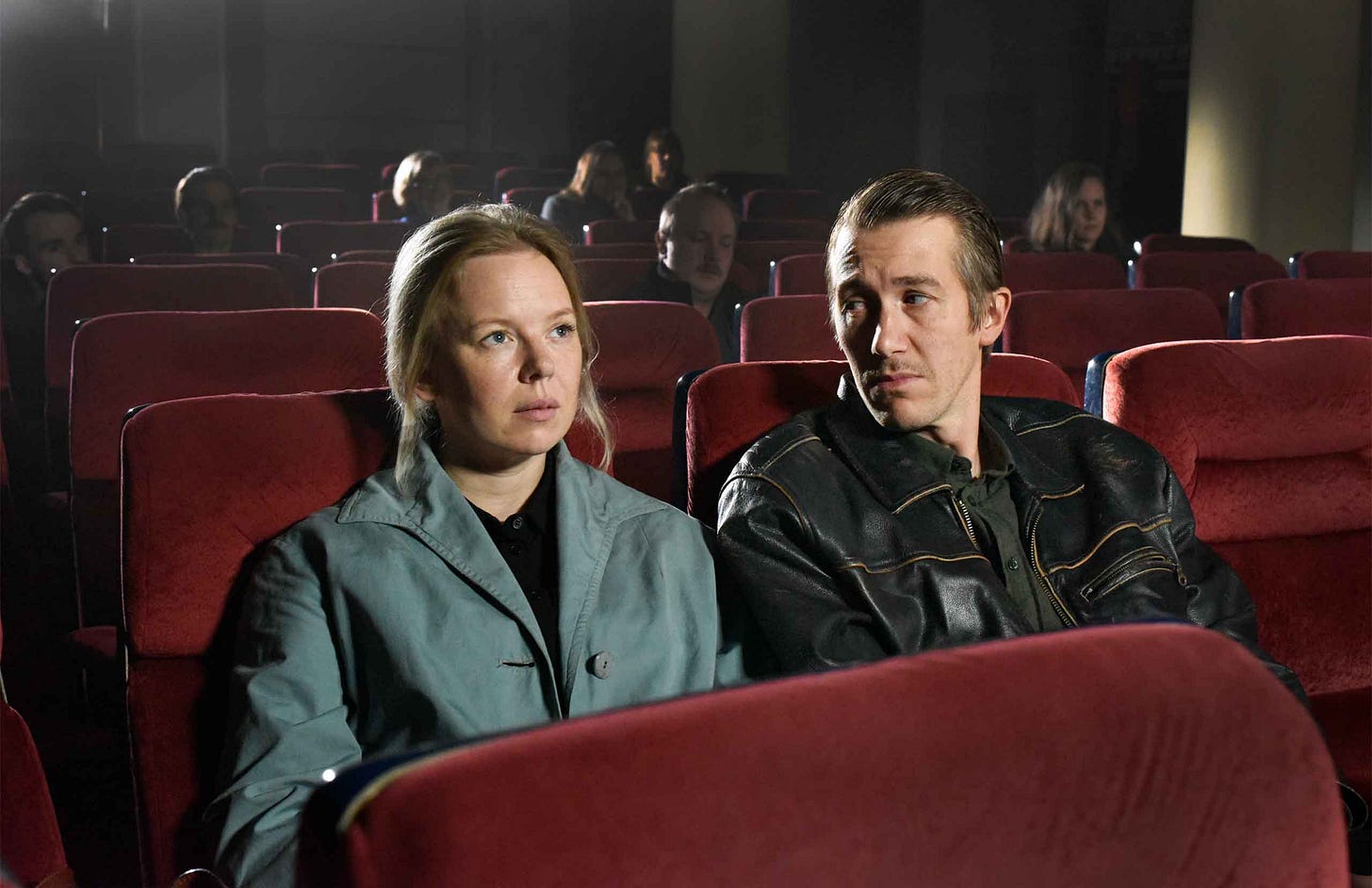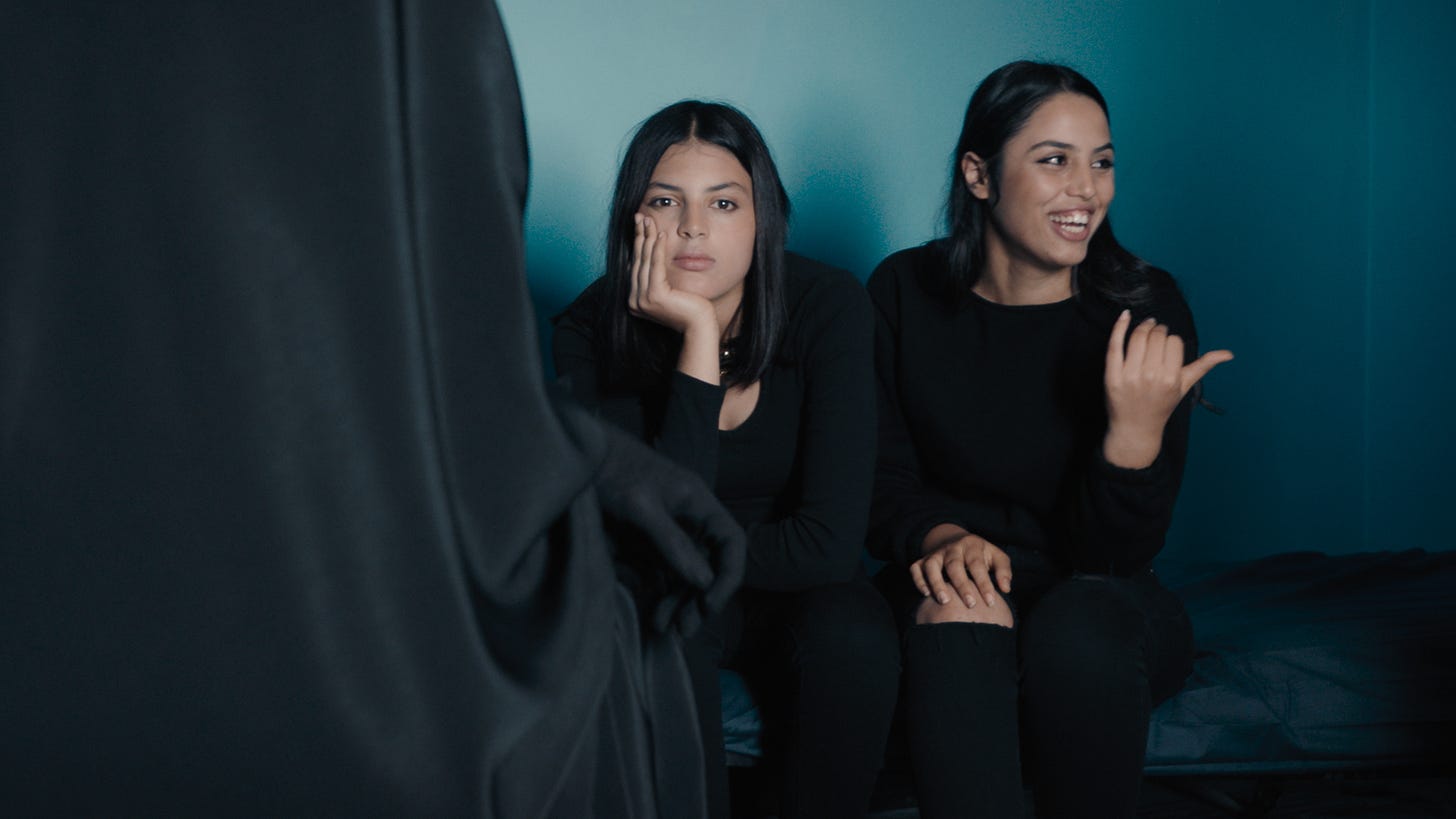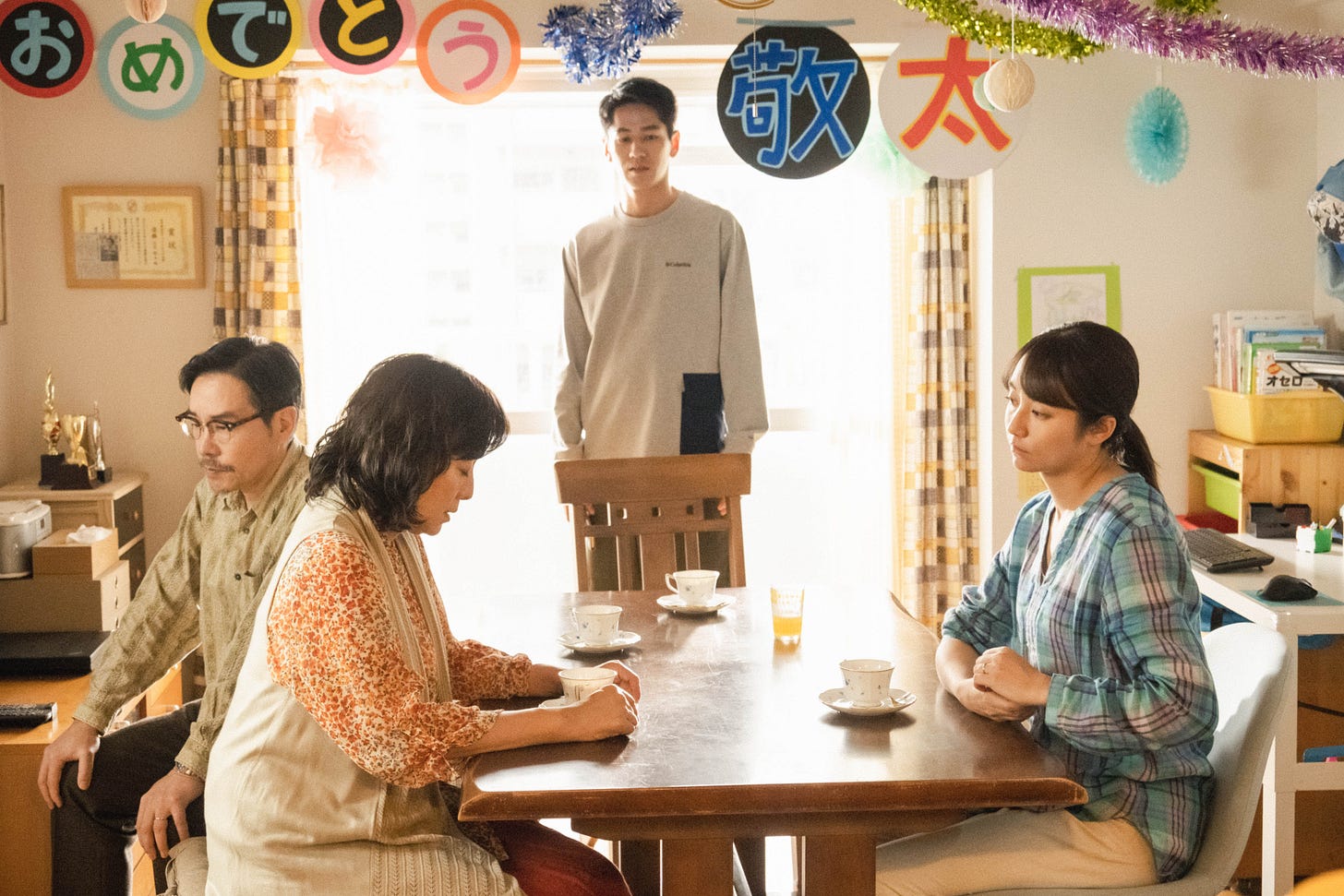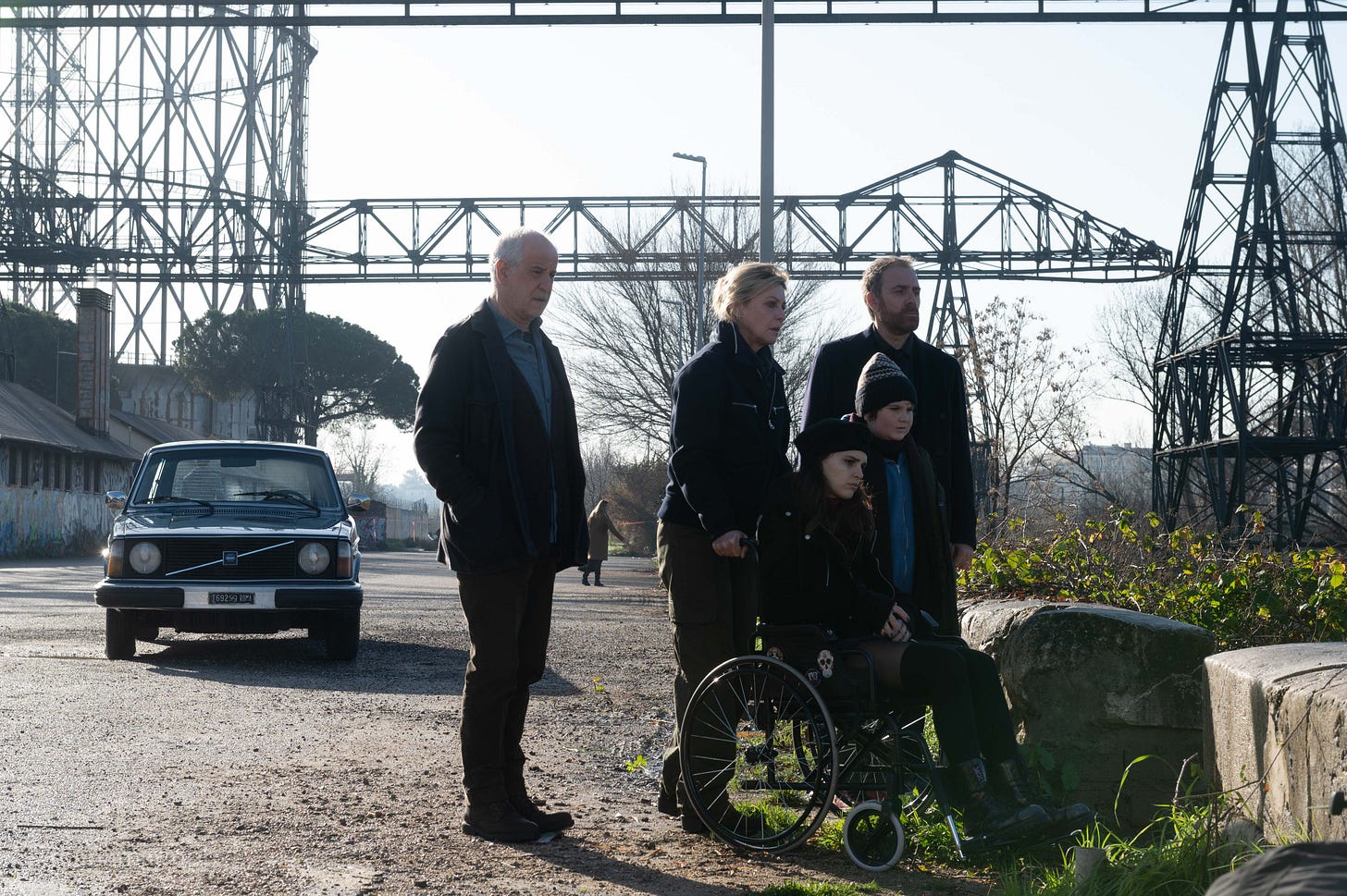Munich Filmfest (2023) Reviews Part Three, Weekly Reel #57
Fallen Leaves, Four Daughters, Notes on a Summer, Love Life, The Lost King, Northern Comfort, Tiger Stripes, The First Day of My Life, and Orso
News of the Week: the third and final round of reviews from the Munich Filmfest. After this I’ll get back to normal programming. I also want to cover the strikes, which are monumental in many ways, but is now dragging on so long that non-HW people have tuned out. I’ll also write another Berlin Dispatch, most likely covering the Babylon theater and its political proximity.
Save for Later
Fallen Leaves (2023, Aki Kaurismäki, Finland/Germany) is the long-awaited fourth feature in Aki Kaurismäki’s Proletariat quadrilogy. Like its predecessors from thirty years ago, this is a deadpan tragicomedy following two working class people whose lives crisscross at random moments. His highly stylized and immediately recognizable style was the inspiration for many of the indie and auteur films of the nineteen-nineties and aughts—Punch-Drunk Love being the best example, the dregs of mumblecore being the worst. Since finishing the trilogy and beginning Fallen Leaves, Kaurismäki’s festival reputation strengthened, especially The Man Without a Past, winner of the 2002 Grand Prix at Cannes, which was nominated for the foreign language Oscar, but Kaurismäki refused to visit a wartime country. The previous fall, for the same film, Kaurismäki refused to attend the New York Film Festival because the USA denied Abbas Kiarostami, an Iranian, a visa to attend the festival. Kaurismäki announced his retirement in 2017 with The Other Side of Hope (Silver Bear winner), but like any good working class hero, he continued with this Cannes Jury Prize winner.
This terse eighty-one minute film is about Ansa (Alma Pöysti), a supermarket shelf-stocker, and Holappa (Jussi Vatanen), an alcoholic blue-collar laborer, who live in a drab, dank, and super-minimalist, chiaroscurod Helsinki. In this modern remake of The Gold Rush, the film’s cadence slows to a dribble that allows Kaurismäki to achieve a remarkably high number of LPM (laughs per minute). To do so, the film’s style—greatly aided by Kaurismäki-regular Timo Salminen’s 35mm cinematography, Ville Grönroos’s art direction, and Aino Kaurismäki’s set decoration—combined with Kaurismäki’s rigid scene blocking and one-takes, paradoxically frees the actors from the improv-inducing environments of most comedies, which generally works less often than it doesn’t.
Ansa and Holappa begin and end their relationship multiple times, once because of a faulty sleight-of-hand with her phone number, and then because of general awkwardness. The ploy of the film involves the two stock side-characters for any other film coming together, their synthesis elevating them into main characters. Examples: when they finally plan their dinner date, Ansa goes to the store to buy extra utensils and basic eating equipment. Holappa seems to never have done anything besides his NPC-routines of drinking at the bar with another Kaurismäki-regular, Martti Suosalo, and go to the movies; he even gets fired at regular intervals, how would he be able to keep getting these new jobs? The plot—revealing any more at this point would spoil too much—has a simple two-act play structure. If more was added, it would have been a sign of a less confident director feeling the need to reach at least ninety minutes. Kaurismäki even goes for a Ukrainian war joke, which impressively and sensitively lands.
I highly recommend Fallen Leaves, which will be released theatrically soon.
Four Daughters (2023, Kaouther Ben Hania, France/Saudi Arabia/Germany/Tunisia/Cyprus), more appropriately originally titled Les Filles d'Olfa, is about a Tunisian woman, Olfa (played by Olfa herself), who lost her two eldest daughters to the Islamic State in Libya. To tell her story, Olfa and her two remaining daughters (Eya and Tayssir) are cast as themselves; the two missing daughters are played by actors (Nour Karoui and Ichraq Matar), and an Olfa stand-in (Hind Sabri) was brought in to play the raw emotional scenes. The real life story and its fictionalized representations clash to such a large extent that the boundaries between the two often blend, revealing that crack in storytelling between reality/fiction better than most efforts. It’s as if writer-director Kaouther Ben Hania watched the final scene of Waltz with Bashir and wanted to reveal the story of that grieving woman in the same reality-bending structure of the dreams-as-animations.
Four Daughters, winner of the top Munich Filmfest award, takes place in a Brechtian dressed-down set, many times in the make-up room and other obvious behind-the-scenes fixtures. The point of the docufiction, as explained to Olfa sitting with her two remaining daughters in the beginning, is to dramatize pivotal scenes from their lives. They brought in two actors for the two missing daughters, who perfectly look the part after costume/make-up, and a famous Tunisian-Egyptian actor to play Olfa, who ends up mostly shadowing Olfa and vice versa. The structure—two real daughters, two actor daughters, and two mothers—fits the doubling of the film’s overall structure. When they recreate scenes, they often cross between the world of the documentary and the film set without visual or temporal breaks like that scene between Leonardo DiCaprio and Timothy Olyphant in Once Upon a Time… in Hollywood.
They proceed chronologically through the timeline, showing how Olfa raised the four daughters on her own. There was one man who temporarily became their “uncle”/surrogate father, but like the actual person, the actor portraying him found the filming of events too real, freaked, and left. Because the two actors looked and acted the part, and because it was the first time in years all four “daughters” were together again, the actors are repeatedly stuck in the uncanny valley without a way out. When the two older daughters reached puberty, which coincided with the Arab Spring, they began adopting the values of Islam and, most notably, the headscarves and their confining structural taboos. When the Islamic State made gains in Libya following the first Civil War, the two older daughters went to join the group and marry their officers. Eventually the IS cell in Libya was meted out and the daughters were sent to prison, where they remain to this day. This film is largely a method to de-radicalize the two daughters, who, even with their husbands long dead or tortured in custody, are still adherents.
Needless to say, the story—and this film—get very real very fast. When the two daughters escape to the Islamic State, Olfa and her two young daughters appear on Tunisian TV and become minor celebrity faces to the kind of familial destruction that force was causing. The film cuts between those clips and the docu-fictionalized dramatizations, revealing another layer of visual representation that captures the surreal nature of Olfa’s position as a character and a person at the same time. These two positions aren’t mutually exclusive, as documentaries and bio-pics prefer to have it; that Olfa is a mother and person with complex feelings that can’t be reduced into broadcast soundbites. This film nobly gives her and her daughters that lost agency often denied to Arab citizens in Europe.
Notes on a Summer (2023, Diego Llorente, Spain) is Diego Llorente’s first feature-fiction film that follows close to the documentary path he set out in his previous short films. Through an anthropological lens, we watch Marta (Katia Borlado in her first film) as if taking notes on her summer. She lives in Madrid with her boyfriend, Leo (Antonio Araque), studying and starting a stable life. But when Marta goes up to her hometown for the summer, several days before Leo, she falls back into her old routines with her family, friends (drinking large amounts of Asturian sidra), and previous boyfriend/fwb, Pablo (Álvaro Quintana), who stayed behind in their small town working a blue-collar packaging job. This fantasy vacation is cut short when Leo surprises Marta by showing up a day early, which throws off the established equilibrium and forces her to confront the reality of growing up.
Perhaps because of my affinity towards modern Spanish dramas set in the countryside, Notes on a Summer is an excellent low-budget depiction of universal themes represented on a small scale. Llorente, whose previous short films deal with tensions between small town cultures passively lost to Madrid, doesn’t dwell on the within-reach lamentation that consumes many nostalgists. He understands the fantasy of retaining one’s hometown influences in preventing them from reaching maturity. Aided by Adrián Hernández’s rich cinematography, Borlado’s alluring trance easily draws in the viewer to her situation, which, from the outside, isn’t morally sound, but we sympathize and continue watching. While Leo offers Marta the mature adult world, it doesn’t come with the same care-free passion as the local boy provides. And we’re halfway on board with this, which shows the value of cinema, but as the story progresses, both the audience and Marta realize the fun we’ve been having must come to an end.
Notes on a Summer will be released this fall.
Save (a bit) for Later
Love Life (2022, Kôji Fukada, Japan/France) drags on through the first two acts at an Ozuan pace with a resolution and third act that mostly makes up for them. Taeko (Fumino Kimura) and Jirô (Kento Nagayama) live with their son, who is from Taeko’s previous marriage with Paku (magnetically played by non-actor Atom Sunada). One day, the son dies in a bathtub incident and the fragile world Taeko and Jirô set up dissolves. Paku, showing up at the funeral crazed and distraught, shakes Taeko out of her subdued Japanese mourning—he’s a deaf Korean who can’t manage a steady job and housing—with his fully animated expressions and emotions. Taeko takes Paku under her wing, she feels she must protect him as a surrogate to her son, who’s also the last linking piece, but he’s not being fully honest. True to its name, there’s a certain aspect of life to love that his film explores, which may seem culturally dependent until you realize that deaf Koreans aren’t always shaking Japanese people out of their somber grief.
The Lost King (2022, Stephen Frears, UK) is the real-life story of Philippa Langley (Sally Hawkins) discovering the remains of King Richard III, a figure with a distorted past due to his Plantagenet dynasty and portrayal as a wicked hunchback by Dick Shakespeare. Mostly just a star-vehicle for Hawkins about a mildly interesting period in English royal history, the film’s humor is… (I tried making a joke about Richard’s curved spine but couldn’t make the vertebrae connect). In short, this amateur historian upends the always haughty English royal history establishment by discovering and revising an overlooked blemish, which in turn allows her to discover her own agency in a male-dominated society. To do so, Frears knee-capped Steve Coogan into being as unfunny as possible so he wouldn’t upstage Hawkins. This film is for the older crowd, a teaser for geezers and geezelles.
Northern Comfort (2023, Hafsteinn Gunnar Sigurðsson, Iceland/UK/Germany) is a serviceable comedy but relies on highly contrived bits. (Why does every modern satire need to have an influencer couple where the woman is portrayed as a ditzy Paris clone carrying around her bf like a lap dog?) That couple offers nothing to the film plotwise, which involves a group of aerophobics taking a class to overcome the fear. As one can guess, their planned test flight goes wrong, and they’re stranded in Iceland. At the heart of the story is Sarah (played greatly by Lydia Leonard), who is trying to overcome her fear before a vacation with her boyfriend and his daughter (from another mother). Timothy “Peter Pettigrew” Spall admirably attempts to hold the comedy of the film together as the ex-army officer turned best-selling author. A fine, light date movie, if you will.
Pass
Tiger Stripes (2023, Malaysia/Taiwan/France/Germany/Netherlands/Singapore/Qatar/Indonesia) was one of the Cannes standouts that I was looking forward to too much. A fable about a Malaysian girl getting her period for the first time and then deals with the social pressures that come with being the generational pioneer. The other girls, who all live in a deeply repressed religious-cult-state, think she’s an unclean animalistic whore, which turns her into a mythical tiger that takes its revenge. Not for me.
The First Day of My Life (2023, Paolo Genovese, Italy) makes one think, what the fuck happened to Italian cinema?
Orso (2023, Bruno Mercier, France) is about a film about bipolar woman who terrorizes her lover, but it’s the viewer who sits through this who really gets terrorized.
Thank you once again for checking out my Substack. Hit the like button and use the share button to share this across social media. And don’t forget to subscribe if you haven’t already done so.








